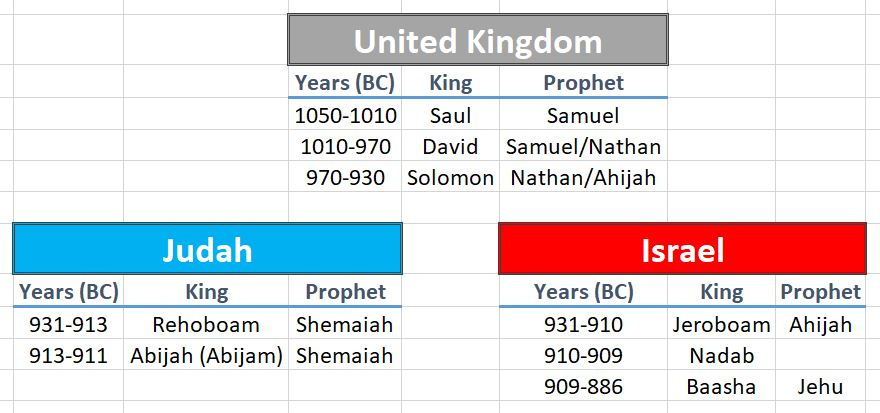We have a new family on the throne of Israel.
Baasha exterminated the entire family of Jeroboam (1 Kings 15:27-30). But, will things be any different?
We’re about to find out.
The Overview of Baasha’s Reign.
After killing Nadab, Baasha becomes the next king of Israel.
In the third year of Asa king of Judah, Baasha the son of Ahijah became king over all Israel in Tirzah, and reigned twenty-four years. He did evil in the sight of the LORD, and walked in the way of Jeroboam, and in his sin by which he had made Israel sin. (1 Kings 15:33-34)
Baasha ended up with the third longest reign of any king in the northern kingdom’s history, which was 24 years.
But like Nadab, we know almost nothing he accomplished - or tried to accomplish - during his reign, even though he surely accomplished many things (1 Kings 16:5). And that’s saying something, considering he reigned for 24 years.
But what we do know is Baasha “did evil” in God’s sight and continued down the same path Jeroboam had walked, and in the same idolatrous behavior.
The Word of the Lord Concerning Baasha.
Because Baasha did the same things Jeroboam did, the same message of judgment was passed on his house.
Then the word of the LORD came to Jehu the son of Hanani, against Baasha, saying: "Inasmuch as I lifted you out of the dust and made you ruler over My people Israel, and you have walked in the way of Jeroboam, and have made My people Israel sin, to provoke Me to anger with their sins, surely I will take away the posterity of Baasha and the posterity of his house, and I will make your house like the house of Jeroboam the son of Nebat. The dogs shall eat whoever belongs to Baasha and dies in the city, and the birds of the air shall eat whoever dies in the fields." (1 Kings 16:1-4)
God had made Baasha “something” out of “nothing,” yet because Baasha had not honored or served God, he would be brought to “nothing” again. He delivered this message to Baasha through one of His prophets, just like He did with Jeroboam.
And also the word of the LORD came by the prophet Jehu the son of Hanani against Baasha and his house, because of all the evil that he did in the sight of the LORD in provoking Him to anger with the work of his hands, in being like the house of Jeroboam, and because he killed them. (1 Kings 16:7)
As an interesting side note, the prophet Jehu was the son of Hanani, who was also a prophet (2 Chronicles 16:7-10). We’ll learn more about Hanani when we study King Asa - king of the southern kingdom of Judah.
Baasha’s Failed Border Strategy.
We do have a record of one attempted accomplishment of Baasha - he’s just a side character in this scene, Asa is the main king under consideration.
People from the northern kingdom of Israel moved south during Asa’s reign because they saw the Lord God was with him (2 Chronicles 15:9). Baasha decided he had to put an end to his citizens leaving his kingdom, so he fortified the border city of Ramah as a means of “border control” (2 Chronicles 16:1).
However, Baasha’s “immigration policy” fails because Asa pays the king of Aram, who ruled in Damascus to Israel’s north, to break his alliance with Baasha and attack his northern border (2 Chronicles 16:2-3). The king of Aram does this, and Baasha is forced to reposition his military on his northern border, abandoning the fort at Ramah (2 Chronicles 16:4-5).
Once Israel’s troops were gone, Asa’s men arrived in Ramah and carried away all the stones and timber used in the fortification to build up Judah’s fortresses (2 Chronicles 16:6).
Crowning Principles.
Good people will eventually leave bad leaders.
Baasha tried to implement a strict border policy because quite a few of his citizens were moving to Judah because they saw God was with King Asa. This was because King Asa served the Lord and Baasha didn’t.
Faithful individuals will not allow leaders to lead them down the wrong path. If necessary, they will find a leader who is following that which is right. This is one of the reasons why the shepherds of the church must lead the flock in the right path, after the “Chief Shepherd” (1 Peter 5:1-4).
After a while, churches that vear off from the way which is right will lose all of their faithful people - because they will go somewhere that is following the Lord. If faithful people cannot bring about the needed changes, they will go where people are actually serving the Lord. That’s what happened to Israel during Baasha’s reign, and it still happens today.
It’s just as important to learn from bad examples as it is from good examples.
Baasha knew the sins of Jeroboam and his refusal to serve the Lord. He also knew what happened to Jeroboam’s house - because he’s the one who destroyed Jeroboam’s family (1 Kings 15:27-30).
And yet, he failed to learn from Jeroboam’s bad example. Baasha followed right along in Jeroboam’s steps. As a result, his family faced the same fate Jeroboam’s family faced.
If we follow in the steps of those who refused to serve the Lord, do we really think our end will be any different than theirs? (Matthew 25:46).







I'm smiling because God is awesome. This is a timely message just like the rest about leadership. I pray that all who read this will listen to what the Spirit of the Lord is saying. Thank you for the message.